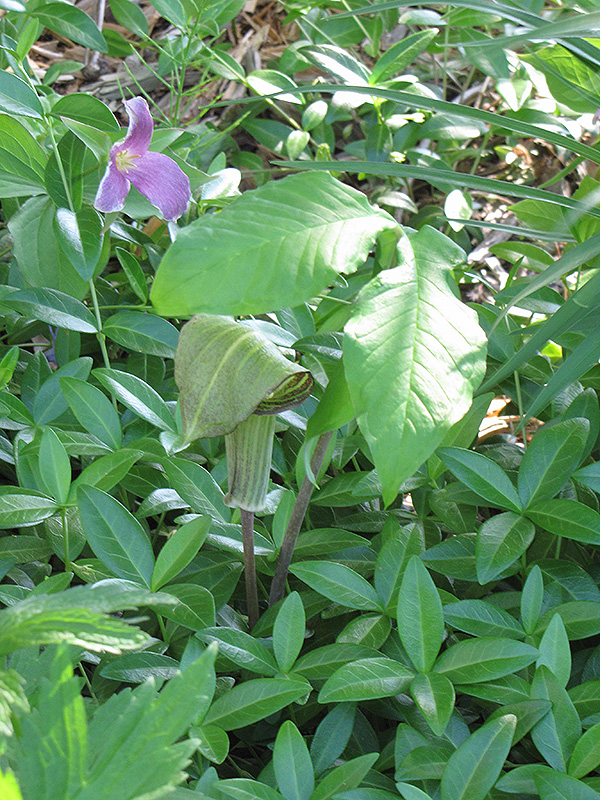Hybrid Jack-In-The-Pulpit
Arisaema x triphyllum
Plant Height: 8 inches
Flower Height: 16 inches
Spread: 12 inches
Sunlight:
![]()
![]()
Hardiness Zone: 4
Other Names: Dragon Root
Description:
This familiar woodland plant is usually found near water; the flower is actually a striped green spathe that surrounds and shelters its flower spike; it reaches one to two feet tall by mid spring; an interesting accent planting along shaded walkways
Ornamental Features
Hybrid Jack-In-The-Pulpit features solitary light green trumpet-shaped flowers with deep purple stripes at the ends of the stems in early summer. Its pointy leaves remain green in colour throughout the season.
Landscape Attributes
Hybrid Jack-In-The-Pulpit is an open herbaceous perennial with an upright spreading habit of growth. Its medium texture blends into the garden, but can always be balanced by a couple of finer or coarser plants for an effective composition.
This is a relatively low maintenance plant, and usually looks its best without pruning, although it will tolerate pruning. Deer don't particularly care for this plant and will usually leave it alone in favor of tastier treats. It has no significant negative characteristics.
Hybrid Jack-In-The-Pulpit is recommended for the following landscape applications;
- General Garden Use
Planting & Growing
Hybrid Jack-In-The-Pulpit will grow to be about 8 inches tall at maturity extending to 16 inches tall with the flowers, with a spread of 12 inches. It grows at a slow rate, and under ideal conditions can be expected to live for approximately 5 years. As an herbaceous perennial, this plant will usually die back to the crown each winter, and will regrow from the base each spring. Be careful not to disturb the crown in late winter when it may not be readily seen!
This plant does best in partial shade to shade. It does best in average to evenly moist conditions, but will not tolerate standing water. It is very fussy about its soil conditions and must have rich, acidic soils to ensure success, and is subject to chlorosis (yellowing) of the foliage in alkaline soils. It is quite intolerant of urban pollution, therefore inner city or urban streetside plantings are best avoided, and will benefit from being planted in a relatively sheltered location. Consider applying a thick mulch around the root zone in both summer and winter to conserve soil moisture and protect it in exposed locations or colder microclimates. This particular variety is an interspecific hybrid, and parts of it are known to be toxic to humans and animals, so care should be exercised in planting it around children and pets.

